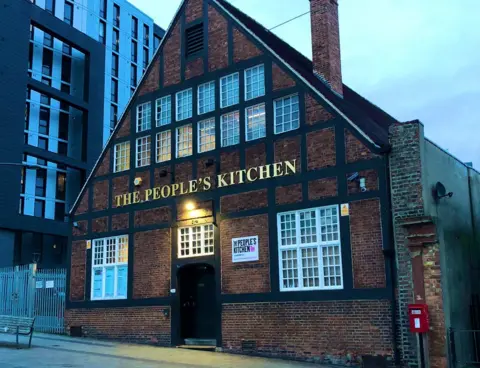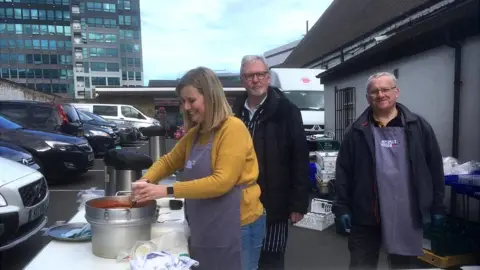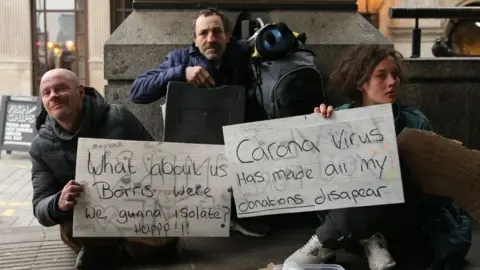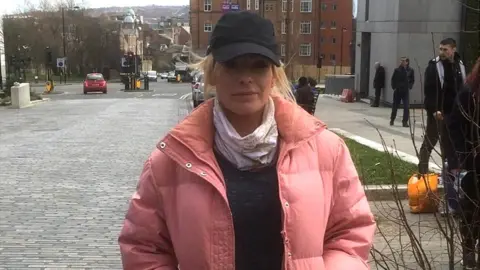Coronavirus: The rough sleepers who can't self-isolate
 People's Kitchen
People's KitchenFor more than 35 years, The People's Kitchen in Newcastle has opened its doors to rough sleepers and vulnerable people.
Based in a former church, tables for up to 120 diners sit in-between floor-to-ceiling beams, with a professional kitchen at the back - once the heartbeat of the operation.
But today it is all empty.
Instead, the charity's dedicated volunteers serve hot soup, sandwiches, cakes and pastries from tables in the car park. In the evening, it is hot food from a catering van.
This has become the new reality as coronavirus cases rise across the UK, in an attempt to keep supplying food to the neediest while minimising the risk of spread.
Many soup kitchens in the local area - particularly church-run ones - have already closed.
 People's Kitchen
People's KitchenThe People's Kitchen estimates it has lost up to 30% of its volunteer workforce, with all those over the age of 70 reluctantly asked to stay home.
One woman, Sophie - who says she spends her nights sleeping rough in a shop doorway - describes the service as her lifeline.
"I'm really scared," she says. "Not many hostels are taking people in because of the virus, and I've got nowhere to stay this evening. No family I can turn to.
"I'd love to be put somewhere, anywhere - even a derelict building.
"If this place [The People's Kitchen] gets closed down, I don't know what I'm going to do."
Sophie has been given baby wipes by the volunteers to help keep herself clean during the day, and is able to shower there too - although the service is limited amid increased cleaning.
She is being regularly supported by the charity's welfare team, but says the outbreak is taking a toll on her mental health.
"I'm low to start with, and this is making it worse. I can't sleep at the moment.
"The doctor has given me anti-depressants, but I don't know what I'd do if the chemist was shut."

- EASY STEPS: How to keep safe
- A SIMPLE GUIDE: What are the symptoms?
- GETTING READY: How prepared is the UK?
- PUBLIC TRANSPORT: What's the risk?

Rough sleepers are thought to be more at risk of contracting the virus, with many having underlying health conditions.
Kalpana Sabapathy, an NHS GP and clinical epidemiologist, says malnutrition and exposure to the elements reduce the effectiveness of the immune system.
Many also have "vulnerabilities that age them prematurely", she says. Some have HIV and TB, while drug and alcohol use can also be a factor.
Communities Secretary Robert Jenrick has announced £3.2m of initial emergency funding to help local authorities provide accommodation and services to rough sleepers who need to self-isolate.
"Public safety and protecting the most vulnerable people in society from coronavirus is this government's top priority," he said.
It is a move welcomed by the Local Government Association, which represents councils in England and Wales. But there are also calls for government to go further.
 Getty Images
Getty ImagesA group of charities that run hostels across the UK is warning that such accommodation is becoming a "Petri dish" for the virus.
Centrepoint's policy director Balbir Chatrik says more must be done to test those living there - with many in dormitories, and others sharing bathroom and kitchen facilities.
The charity also subsidises the work of hostels, but Ms Chatrik says its income has already fallen since the outbreak due to a loss of money gained through fundraising - which has left her "really worried" regarding the impact on such accommodation.
She adds she has also heard reports of homeless individuals being unable to access support from at least one local authority because, while assessments are now being conducted over the phone, calls were going unanswered.
Using now-empty hotels
As part of an initial trial this weekend, 300 rooms are being offered by hotels in London to homelessness charities, with the aim to protect rough sleepers from the spread of the virus.
According to Matt Downie, the director of policy at the charity Crisis, without such steps it is "impossible" for the homeless community to self-isolate.
He believes student accommodation could also be used to house rough sleepers, as many rooms have washing facilities and could be used a self-contained space.
"The ideal outcome", he adds, is something that is already beginning to take place in Glasgow - moving rough sleepers into furnished flats.
Not only does this enable them to self-isolate if needed, he says, it also potentially solves the issue of them being homeless.
 People's Kitchen
People's KitchenIn Newcastle, The People's Kitchen is determined to keep its services running for as long as possible.
It helps other vulnerable people too, like Andy - who has found the local food bank closed.
And Chanel, who says, if such services weren't available, "I couldn't afford anything".
Its volunteers say the community response has been "fantastic", but admit that if just one person attended with symptoms of coronavirus, it could drastically affect their capacity to operate.
They continue to serve food with a smile and conversation. But with the outbreak expected to last for months, it is sadly hard to imagine The People's Kitchen operating from its actual kitchen any time soon.
